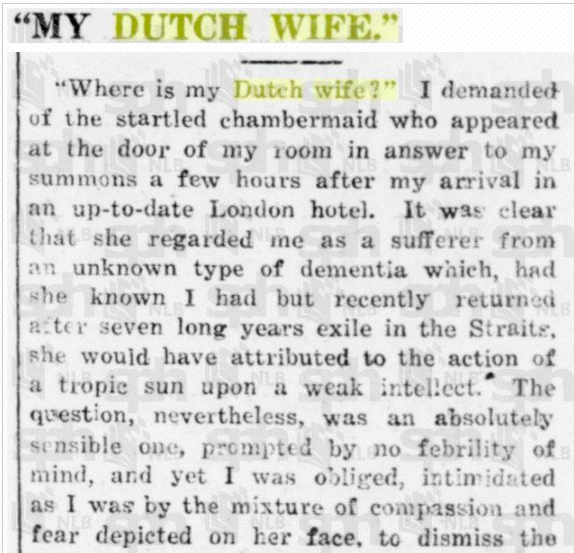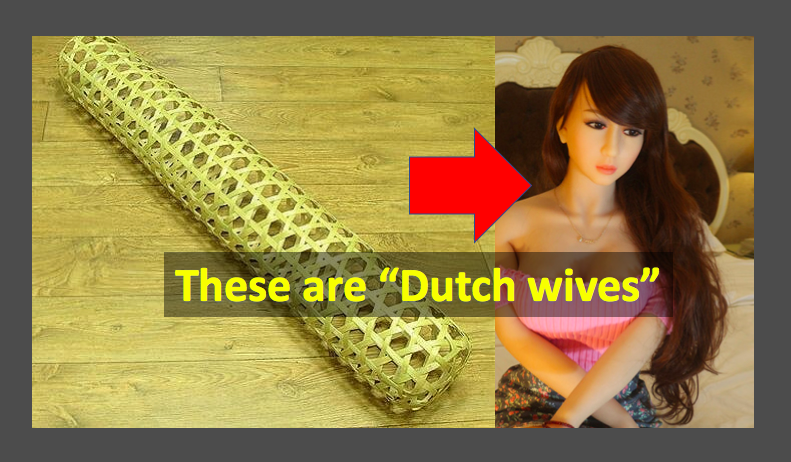Many people in Singapore (and perhaps the rest of Asia and the wider world) cannot sleep without hugging their bolsters at night.
It is highly unlikely that you don't know what a bolster is, but here's what it looks like, just in case.
 Image via
Image via
The bolster's history in the region
The humble bolster has come a long way and it actually has some history (or even origins) in our region.
Back during the days when Southeast Asia was mostly colonised by the Europeans, a special bolster that was made of rattan or wicker woven into the shape of a modern day bolster, and wrapped in linen, was invented.
It helped people to sleep better at night in the region's tropical heat by allowing them to hug it and throw a leg over it while lying on their side. The hollow insides of the pillow allowed the user to keep cool in the tropical heat.
[caption id="" align="aligncenter" width="462"] Image via onehallyu.com[/caption]
Old bolsters here known as Dutch wives
This pillow would come to be known in English as the "Dutch wife" because the popular story goes that it was invented by Dutch colonialists in Indonesia a few hundred years ago.
But there is also more to the origin on how the Dutch wife got its English name.
Britain and Holland had fought a series of Anglo-Dutch wars in the 17th century and were rival powers in Southeast Asia acquiring colonies for their respective empires.
It was from this rivalry, that the British used the word "Dutch" to describe things that are false or fake, such as Dutch courage, Dutch auction, and of course Dutch wife.
Both stories on how this bolster came to be known as a Dutch wife may likely be complementary.
The Dutch wife would grow in popularity in the region, and European men during the colonial era who returned to Europe in those days were sometimes disappointed to have to re-adjust back to life without their Dutch wives.
 Old advertisement in the Malaya Tribune, Dec. 22, 1915. Source: NewspaperSG
Old advertisement in the Malaya Tribune, Dec. 22, 1915. Source: NewspaperSG
[related_story]
Dutch wives grew on those who lived in Singapore and the region
In a lengthy article/letter published in the Singapore Free Press on Sep. 3, 1923, a British man lamented that his "up-to-date" London hotel did not know, let alone provide, a Dutch wife.
He had just returned to Britain, after spending seven years in Singapore and the Straits Settlements (Singapore, Penang, and Malacca).
 Singapore Free Press, Sep. 3, 1923. Source: NewspaperSG
Singapore Free Press, Sep. 3, 1923. Source: NewspaperSG
Waxing lyrical about the Dutch wife he left behind, he went on to say:
"As I have said, only those who have lived in the parts I have spoken of, will appreciate my sense of loss. They well support me too in the what may seem astounding assertion that within 24 hours of his arrival in the 'immoral cesspool', Singapore, the formerly upright and moral assistance fresh from home finds himself provided with a companion who will share his nocturnal existence, at all events during his sojourn in the East. Even after one has shaken from one's feet the dust of the Orient, one cannot free one's self from the lady who has been thrust upon you in the days of your freedom from guile."
New-age Dutch wives
As times changed and technologies such as air-conditioning came along, the old Dutch wife evolved to become the modern bolster.
But the story of the Dutch wife doesn't end there.
The modern day Japanese have taken the Dutch wife to another iteration, with their creation of what they call the Datch Waifu.
These are essentially realistic-looking sex dolls.
 Image via
Image via
Oh well.
Top image adapted via onehallyu.com and aliexpress.
If you like what you read, follow us on Facebook, Instagram, Twitter and Telegram to get the latest updates.
